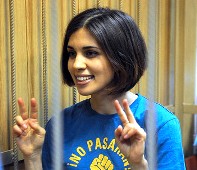Khamovnichesky court in Moscow has prolonged the detention of three Pussy Riot members until 12 January. The term of their arrest should have expired on 24 July, but the judge complied with the prosecution’s application to prolong the detention for 6 more months.

Pussy Riot’s Nadezhda Tolokonnikova
Maria Alekhina and Ekaterina Semutsevich have been accused of hooliganism for allegedly staging an anti-Putin performance in Moscow’s Christ the Saviour Cathedral. They face up to seven years in prison if convicted.
Friday 20 July was the first day of preliminary hearings on Pussy Riot case. The judge was expected to set the date for the trial; decide whether it would be closed, and consider several applications. But the only thing the judge did was satisfying the prosecution’s application on detention prolongation.
On Monday 23 July, Pussy Riot’s defence team will apply to call president Vladimir Putin and Patriarch Kirill, the head of the Russian Orthodox church, to the court as witnesses.
Dozens of Pussy Riot supporters gathered near the court building to protest against the band’s prosecution. Four of them were arrested after chanting out anti-Kremlin slogans and spreading pro-Pussy Riot leaflets.
Russian intellectuals and artists have condemned Pussy Riot members’ persecution in an open letter, stating the criminal case “compromises the Russian judicial system” and “undermines the confidence in Russian authorities”. The letter was signed by notable directors, writers and actors, including Viktor Shenderovich, Dmitry Bykov, Chulpan Khamatova, Mikhail Zhvanetskty, Eldar Ryazanov.
Not many of them attended Pussy Riot protest action on 20 July. As Grigory Chkhartishvily told Index on Censorship, it would be right for Russian intellectuals, who supported Pussy Riot in the open letter, to “devirtualise” so that the authorities could “note they exist”. He also said the Pussy Riot case raises the issue of the state using “medieval church standards instead of judicial ones”.
The number of protesters near the court on 20 July did not exceed 100 people. One of them, notable Russian poet Lev Rubinstein, told Index that in spite of international rights activists’ community concerns over Pussy Riot’s persecution, “most people in Russia are simply not aware of Pussy Riot case, or have heard the name and condemn the women without finding out the details.”
There are two reasons for this: Censorship on Russian television prevents the public from understanding the Pussy Riot story in detail, and the lack of solidarity between activists in Moscow and other Russian cities prevents others from protesting against the group’s prosecution outside the capital.




